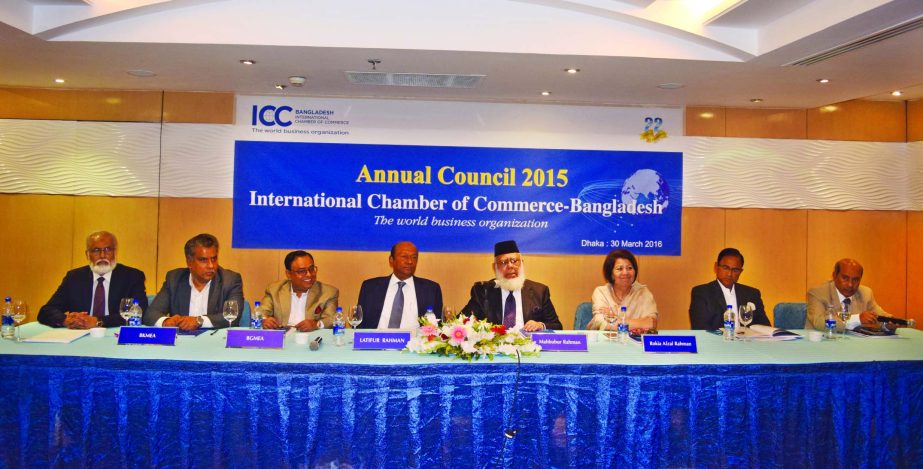
Economic Reporter :
Bangladesh has successfully come out from LDC to a lower middle-income group. However, in order to be categorized as a middle-income country by 2021, Bangladesh has to consistently maintain the status for the next six years.
But without a solid industrial base, adequate infrastructure, un-interrupted power supply, exploration of natural resources (gas, coal etc.), skilled works force etc., it will be difficult to sustain the present growth rate or even achieve higher growth, said ICC Bangladesh President Mahbubur Rahman while he was presenting the Executive Board Report.
Bangladesh will require increasing GDP growth to 7.5 to 8 percent per year based on accelerated export and remittance growth. Both public and private investment will need to increase as well. Growth will also need to be more inclusive through creation of productive employment opportunities in the domestic economy. To sustain accelerated and inclusive growth, Bangladesh will need to manage the urbanization process more effectively, as well as prepare for adaptation to climate change impacts, the Council Report added.
Mahbubur Rahman said Bangladesh needs to sustain its growth to reduce extreme poverty and boost shared prosperity. And the ultimate necessity is investment, which is still stagnant and insufficient; only 20 per cent of GDP. Private investment increased by only 0.1 per cent and public investment fell short of the target by 0.6 per cent. Low implementation of the ADP is a major factor for lower public investment.
The key challenges for Bangladesh in 2016 will be the acceleration of private investments and the better use of public sector resources to implement important infrastructure. To address the issue structural reforms and developments in infrastructure and energy is vital. Bangladesh has the potential to attract FDI from a wide range of countries, the report observed.
The Council adopted the Executive Board Report & Audited Financial Statements of ICC Bangladesh for the year 2015.
Among others, ICCB Vice Presidents Latifur Rahman & Rokia A. Rahman; ICCB Board Members Aftab ul Islam; A.S.M. Quasem; Mahbub Jamil; Kutubuddin Ahmed; R. Maksud Khan; Tapan Chowdhury; ICCB Members Md. Matiul Islam, Chairman.
Bangladesh has successfully come out from LDC to a lower middle-income group. However, in order to be categorized as a middle-income country by 2021, Bangladesh has to consistently maintain the status for the next six years.
But without a solid industrial base, adequate infrastructure, un-interrupted power supply, exploration of natural resources (gas, coal etc.), skilled works force etc., it will be difficult to sustain the present growth rate or even achieve higher growth, said ICC Bangladesh President Mahbubur Rahman while he was presenting the Executive Board Report.
Bangladesh will require increasing GDP growth to 7.5 to 8 percent per year based on accelerated export and remittance growth. Both public and private investment will need to increase as well. Growth will also need to be more inclusive through creation of productive employment opportunities in the domestic economy. To sustain accelerated and inclusive growth, Bangladesh will need to manage the urbanization process more effectively, as well as prepare for adaptation to climate change impacts, the Council Report added.
Mahbubur Rahman said Bangladesh needs to sustain its growth to reduce extreme poverty and boost shared prosperity. And the ultimate necessity is investment, which is still stagnant and insufficient; only 20 per cent of GDP. Private investment increased by only 0.1 per cent and public investment fell short of the target by 0.6 per cent. Low implementation of the ADP is a major factor for lower public investment.
The key challenges for Bangladesh in 2016 will be the acceleration of private investments and the better use of public sector resources to implement important infrastructure. To address the issue structural reforms and developments in infrastructure and energy is vital. Bangladesh has the potential to attract FDI from a wide range of countries, the report observed.
The Council adopted the Executive Board Report & Audited Financial Statements of ICC Bangladesh for the year 2015.
Among others, ICCB Vice Presidents Latifur Rahman & Rokia A. Rahman; ICCB Board Members Aftab ul Islam; A.S.M. Quasem; Mahbub Jamil; Kutubuddin Ahmed; R. Maksud Khan; Tapan Chowdhury; ICCB Members Md. Matiul Islam, Chairman.

